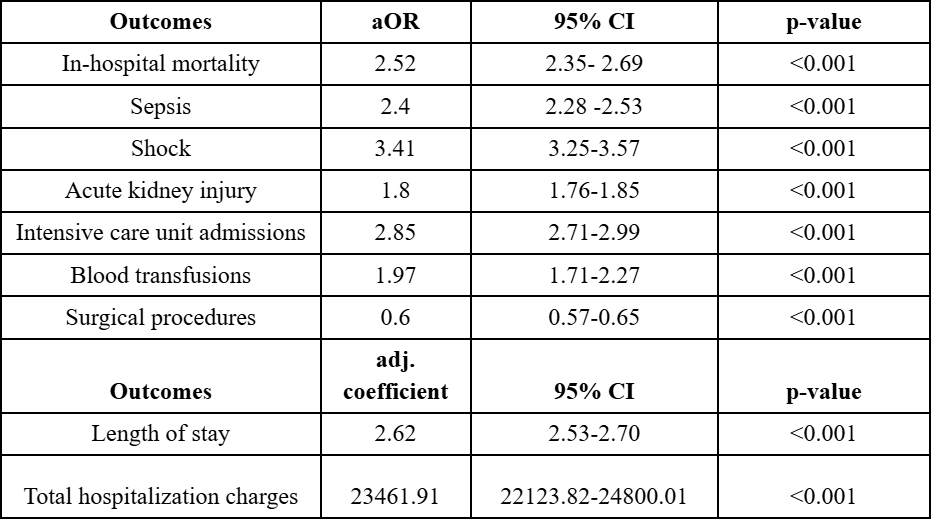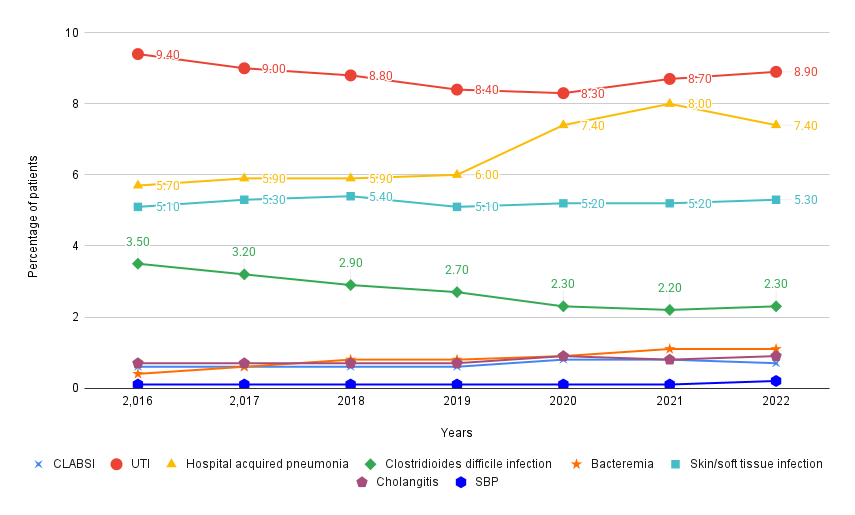Monday Poster Session
Category: IBD
P3312 - Trends, Burden and Impact of Infections on Outcomes in Patients With Crohn’s Disease: Insights From the National Inpatient Sample
Monday, October 27, 2025
10:30 AM - 4:00 PM PDT
Location: Exhibit Hall
- CS
Carol Singh, MBBS
Dayanand Medical College and Hospital
New Jersey, NJ
Presenting Author(s)
Carol Singh, MBBS1, Anmol Singh, MBBS2, Mohammad Naseem, MBBS3, Rahul Chikatimalla, MBBS4, Neelam Chahal, MBBS5, Vikash Kumar, MD6, Aalam Sohal, MD6, Dalbir Sandhu, MD6
1Dayanand Medical College and Hospital, New Jersey, NJ; 2Tristar Centennial Medical Center, Nashville, TN, Nashville, TN; 3Maulana Azad Medical College, New Delhi, Delhi, India; 4Kamineni Institute of Medical Sciences, Narketpalle, Telangana, India; 5Wenzhou Medical University, Wenzhou, Zhejiang, China; 6Creighton University School of Medicine, Phoenix, AZ
Introduction: Patients with Crohn’s disease (CD) face an elevated risk of infections due to underlying chronic inflammation and immunosuppressive therapies. Large-scale, contemporary data on current national trends and the clinical/economic burden of infections in hospitalized CD patients remain limited. This study investigates recent trends, burden, and impact of infections among hospitalized patients with CD.
Methods: The National Inpatient Sample (NIS) Database (2016-2022) was used to identify all adult patients with CD. Patients with CD were stratified into two groups based on the presence or absence of infections. Data was obtained on patient demographics, comorbidities, type of infection, and clinical outcomes. Outcomes assessed include in-hospital mortality, sepsis, shock, acute kidney injury (AKI), intensive care unit (ICU) stay, blood transfusions, and surgical procedures. A multivariate logistic/linear regression analysis was utilized to assess the impact of infections on these outcomes.
Results: Of the 1.3 million patients included in the study, 301,095 (22.9%) developed infections. The most frequent infections were urinary tract infections (UTI) (8.8%), hospital-acquired pneumonia (HAP) (6.6%) and skin/soft tissue infections (5.0%). From 2016 to 2022, rates of infections such as HAP, bacteremia, and cholangitis increased, while rates of Clostridioides difficile infection declined (Figure 1). Infections were associated with significantly worse clinical outcomes, including in-hospital mortality (3.3% vs.1.0%), sepsis (5.2% vs. 2.1%), shock (7.3% vs. 1.9%), AKI (27.1% vs. 14.1%), ICU admissions (6.1% vs. 1.9%), blood transfusions (0.6% vs. 0.3%), but decreased rates of surgical procedures (1.9% vs. 4.4%). After adjusting for confounding factors, patients with infections had higher odds of in-hospital mortality (aOR-2.52, 95% CI-2.35- 2.69 p< 0.001), sepsis (aOR-2.4,95% CI-2.28-2.53,p< 0.001), shock (aOR-3.41, 95% CI-3.25-3.57,p< 0.001), AKI (aOR-1.8, 95% CI-1.76-1.85,p< 0.001), ICU admissions (aOR-2.85, 95% CI-2.71-2.99,p< 0.001), blood transfusions (aOR-1.97, 95% CI-1.71-2.27,p< 0.001), and lower odds of surgical procedures (aOR-0.6, 95% CI- 0.57-0.65,p< 0.001) (Table 1).
Discussion: Our analysis reveals that infections in hospitalized CD patients are common and associated with worse clinical outcomes and increased healthcare utilization. Our findings underscore the need for targeted prevention and early intervention strategies in this population.

Figure: Figure 1. Rates of infections each year from 2016 to 2022.

Figure: Table 1. Results of multivariate logistic regression, assessing the impact of infections on outcomes and resource utilization.
Disclosures:
Carol Singh indicated no relevant financial relationships.
Anmol Singh indicated no relevant financial relationships.
Mohammad Naseem indicated no relevant financial relationships.
Rahul Chikatimalla indicated no relevant financial relationships.
Neelam Chahal indicated no relevant financial relationships.
Vikash Kumar indicated no relevant financial relationships.
Aalam Sohal indicated no relevant financial relationships.
Dalbir Sandhu indicated no relevant financial relationships.
Carol Singh, MBBS1, Anmol Singh, MBBS2, Mohammad Naseem, MBBS3, Rahul Chikatimalla, MBBS4, Neelam Chahal, MBBS5, Vikash Kumar, MD6, Aalam Sohal, MD6, Dalbir Sandhu, MD6. P3312 - Trends, Burden and Impact of Infections on Outcomes in Patients With Crohn’s Disease: Insights From the National Inpatient Sample, ACG 2025 Annual Scientific Meeting Abstracts. Phoenix, AZ: American College of Gastroenterology.
1Dayanand Medical College and Hospital, New Jersey, NJ; 2Tristar Centennial Medical Center, Nashville, TN, Nashville, TN; 3Maulana Azad Medical College, New Delhi, Delhi, India; 4Kamineni Institute of Medical Sciences, Narketpalle, Telangana, India; 5Wenzhou Medical University, Wenzhou, Zhejiang, China; 6Creighton University School of Medicine, Phoenix, AZ
Introduction: Patients with Crohn’s disease (CD) face an elevated risk of infections due to underlying chronic inflammation and immunosuppressive therapies. Large-scale, contemporary data on current national trends and the clinical/economic burden of infections in hospitalized CD patients remain limited. This study investigates recent trends, burden, and impact of infections among hospitalized patients with CD.
Methods: The National Inpatient Sample (NIS) Database (2016-2022) was used to identify all adult patients with CD. Patients with CD were stratified into two groups based on the presence or absence of infections. Data was obtained on patient demographics, comorbidities, type of infection, and clinical outcomes. Outcomes assessed include in-hospital mortality, sepsis, shock, acute kidney injury (AKI), intensive care unit (ICU) stay, blood transfusions, and surgical procedures. A multivariate logistic/linear regression analysis was utilized to assess the impact of infections on these outcomes.
Results: Of the 1.3 million patients included in the study, 301,095 (22.9%) developed infections. The most frequent infections were urinary tract infections (UTI) (8.8%), hospital-acquired pneumonia (HAP) (6.6%) and skin/soft tissue infections (5.0%). From 2016 to 2022, rates of infections such as HAP, bacteremia, and cholangitis increased, while rates of Clostridioides difficile infection declined (Figure 1). Infections were associated with significantly worse clinical outcomes, including in-hospital mortality (3.3% vs.1.0%), sepsis (5.2% vs. 2.1%), shock (7.3% vs. 1.9%), AKI (27.1% vs. 14.1%), ICU admissions (6.1% vs. 1.9%), blood transfusions (0.6% vs. 0.3%), but decreased rates of surgical procedures (1.9% vs. 4.4%). After adjusting for confounding factors, patients with infections had higher odds of in-hospital mortality (aOR-2.52, 95% CI-2.35- 2.69 p< 0.001), sepsis (aOR-2.4,95% CI-2.28-2.53,p< 0.001), shock (aOR-3.41, 95% CI-3.25-3.57,p< 0.001), AKI (aOR-1.8, 95% CI-1.76-1.85,p< 0.001), ICU admissions (aOR-2.85, 95% CI-2.71-2.99,p< 0.001), blood transfusions (aOR-1.97, 95% CI-1.71-2.27,p< 0.001), and lower odds of surgical procedures (aOR-0.6, 95% CI- 0.57-0.65,p< 0.001) (Table 1).
Discussion: Our analysis reveals that infections in hospitalized CD patients are common and associated with worse clinical outcomes and increased healthcare utilization. Our findings underscore the need for targeted prevention and early intervention strategies in this population.

Figure: Figure 1. Rates of infections each year from 2016 to 2022.

Figure: Table 1. Results of multivariate logistic regression, assessing the impact of infections on outcomes and resource utilization.
Disclosures:
Carol Singh indicated no relevant financial relationships.
Anmol Singh indicated no relevant financial relationships.
Mohammad Naseem indicated no relevant financial relationships.
Rahul Chikatimalla indicated no relevant financial relationships.
Neelam Chahal indicated no relevant financial relationships.
Vikash Kumar indicated no relevant financial relationships.
Aalam Sohal indicated no relevant financial relationships.
Dalbir Sandhu indicated no relevant financial relationships.
Carol Singh, MBBS1, Anmol Singh, MBBS2, Mohammad Naseem, MBBS3, Rahul Chikatimalla, MBBS4, Neelam Chahal, MBBS5, Vikash Kumar, MD6, Aalam Sohal, MD6, Dalbir Sandhu, MD6. P3312 - Trends, Burden and Impact of Infections on Outcomes in Patients With Crohn’s Disease: Insights From the National Inpatient Sample, ACG 2025 Annual Scientific Meeting Abstracts. Phoenix, AZ: American College of Gastroenterology.
